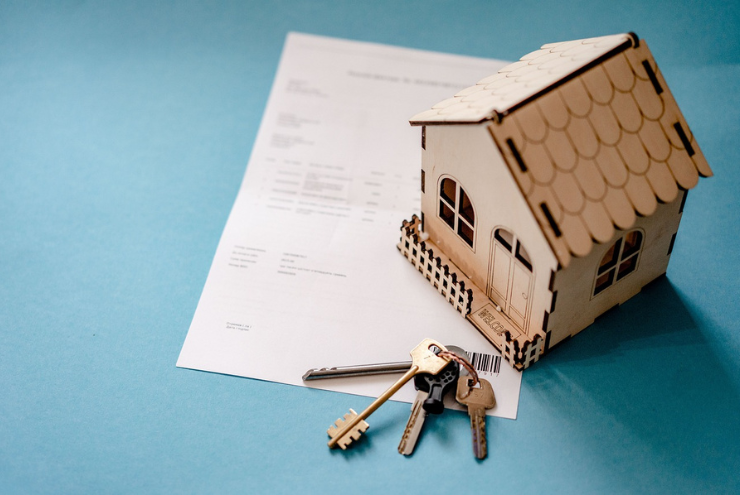When it comes to selling your home, you want to make sure that all of the details are taken care of. One important detail is what happens to your mortgage when you sell your house?
Depending on the situation and how quickly you need to sell, there can be a few different options. In this blog post we will cover mortgage payoff, refinancing, short sale, foreclosure, and deed in lieu of foreclosure – so read on if you’re wondering what happens to your mortgage when you sell your house!
Mortgage Payoff

Selling your home is a great way to pay off your mortgage. When you sell, the proceeds from the traditional sale are used to pay off the balance of your loan. Depending on how much equity you have in your home, you may receive a check for any remaining balance after the mortgage is paid off.
For example, if you owe $150,000 on your mortgage and sell your house for $200,000 then there will be an additional $50,000 left over after paying off the loan that can be given to you as cash or put towards other expenses like closing costs, property taxes, or moving expenses. You can even put the extra money you made from the sale into a the down payment on a new home.
It’s important to remember that even if there isn’t enough money from the sale of your home to cover all of what’s owed on it (known as being “underwater” or negative equity), Homefront can still help by buying it directly from you with no need for financing or bank approval.
This allows us to purchase homes quickly and without hassle so that sellers can move forward with their lives without worrying about debt or foreclosure proceedings.
In addition, selling through Homefront means no commissions or fees associated with listing agents – meaning more money in YOUR pocket. We also provide flexible payment options such as cash payments and installment plans so that sellers can get exactly what they need out of their transaction when they work with us.
Refinancing

Refinancing is a great way to save money and reduce your monthly payments. It can be especially beneficial if you have an adjustable-rate loan or if interest rates have dropped since you took out your loan.
For example, let’s say you bought a house in Spokane five years ago with an adjustable-rate mortgage of 4%. Now the current interest rate is 3%. Refinancing could help you take advantage of this lower rate and potentially save thousands of dollars over the life of the loan.
Another benefit to refinancing is that it can help free up some extra cash each month by reducing your monthly payment amount. This could give you more flexibility when it comes to budgeting for other expenses like groceries, utilities, or even vacations.
You may also want to consider refinancing if you need access to additional funds for home improvements or repairs. You can use the equity in your home as collateral for a new loan which will allow you to borrow money at a lower interest rate than most other types of loans.
When considering whether or not refinancing makes sense for your situation, make sure to weigh all the pros and cons carefully before making any decisions.
Talk with multiple lenders about their terms and conditions so that you understand exactly what kind of deal they are offering before signing anything. Also keep in mind that there may be closing costs associated with refinancing, so make sure those are factored into any calculations as well.
When refinancing, it is important to consider the long-term financial implications of your decision. However, if a short sale is necessary due to an inability to pay off the loan, Homefront can help you navigate this process and get the best outcome for your situation.
Short Sale

A short sale is a great option for homeowners who are facing foreclosure or have fallen behind on their payments and need to get out from under their debt quickly. It allows them to sell their home for less than what is owed on it, meaning they don’t have to worry about paying the difference.
The process of a short sale can be complicated and time-consuming, so it’s important to understand all the steps involved before making any decisions.
First, you will need to contact your lender and explain why you are considering a short sale. Your lender may require documentation such as bank statements or proof of income in order to approve the real estate transaction.
Once approved by your lender, you will then need to find an experienced real estate agent who specializes in short sales. They will help guide you through the process and negotiate with potential buyers on your behalf.
It’s also important that they work closely with your lender throughout this process since lenders often require certain conditions to be met before approving a deal.
Next, you will need to set up an appraisal of your property so that potential buyers know exactly what they are getting into when making an offer on your home.
This helps ensure that everyone involved gets fair market value for the property being sold in a timely manner without any surprises down the line due to hidden issues or discrepancies between buyer and seller expectations regarding the condition of the property at closing time .
Finally, once all parties agree upon terms including the price offered by the buyer, closing costs, etc., then escrow can be opened up so funds can begin transferring hands until the title transfer is completed.
Afterward, both sides should receive copies of all paperwork related to the transaction along with the final settlement statement which outlines details like net proceeds received by the seller after taking into account fees paid during the course of the sale.
Short sales provide sellers with an opportunity to reduce their financial burden and start fresh while avoiding the long-term damage caused by foreclosure proceedings. With the right team in place – attorney, realtor, mortgage broker – plus proper preparation ahead of time; these types of transactions can go smoothly even if there might still be some bumps along the way.
A short sale can be a great way to avoid foreclosure, but it’s important to understand the implications of such an action before making any decisions. Next, let’s look at what happens in a foreclosure situation.
Key Takeaway: A short sale is a great option for homeowners facing foreclosure or who have fallen behind on payments. With the right team in place and proper preparation, these transactions can go smoothly.
Foreclosure
Foreclosure is a difficult situation for any homeowner to face. It occurs when the lender takes possession of the property and sells it at auction in order to recoup their losses. Foreclosure can be caused by many factors, including missed mortgage payments, job loss, or illness.
The foreclosure process begins with a Notice of Default (NOD). This document informs you that your loan is in default and that if you do not make up the payments within a certain amount of time, then foreclosure proceedings will begin.
After this notice has been issued, the mortgage lender may also issue other notices such as an Intent to Accelerate or Notice of Sale which inform you that they are beginning the foreclosure process.
Once these documents have been sent out, lenders typically hire an attorney who will file a complaint against you in court and serve you with papers requesting payment on your debt. If no payment is made after 30 days from receiving these papers then the lender can proceed with selling your home at auction.
The proceeds from this sale go towards paying off your debt but if there isn’t enough money left over after all debts are paid off then you may still owe money even after losing your home through foreclosure.
If facing foreclosure, it is important to remember that there are options available for homeowners trying to avoid this outcome. These include refinancing or negotiating a short sale agreement with their lender, where they sell their house for less than what they owe on it as long as both parties agree upon terms beforehand.
Additionally, speaking with housing counselors or attorneys familiar with real estate law can help provide advice about how best to handle this situation depending on individual circumstances. State laws regarding foreclosures vary so consulting local real estate market experts is key when navigating through this difficult process.
Foreclosure can be a difficult process, but with the right guidance, it can also provide an opportunity for homeowners to avoid the full consequences of defaulting on their mortgage. Next, we will look at what happens when you opt for a deed in lieu of foreclosure.
Key Takeaway: When facing foreclosure, there are options available such as refinancing or negotiating a short sale agreement with the lender. It is important to speak with housing counselors and attorneys familiar with real estate law for advice on how best to handle this situation.
Deed in Lieu of Foreclosure

A deed in lieu of foreclosure is a last resort option for homeowners who are unable to make their mortgage payments and facing the possibility of foreclosure.
It allows them to voluntarily transfer ownership of their property back to the lender in exchange for having their debt forgiven. This option should only be considered as a last resort, as it can still negatively impact your credit score and financial standing.
When considering this option, you must first contact your lender and explain why you cannot make your mortgage payments. You will need to provide evidence that shows you have explored all other options such as refinancing or selling the home before turning to a deed in lieu of foreclosure.
Your lender may require additional documentation such as bank statements, proof of income, tax returns, etc., so it’s important that you gather these documents beforehand if possible.
Once approved by your lender, they will issue an agreement outlining all terms related to the transaction including any fees associated with it and when those fees must be paid by. Once both parties sign off on the agreement, ownership of the property is transferred back to the lender who then forgives any remaining balance owed on the loan.
It is important to note that while this option does allow homeowners to avoid going through foreclosure proceedings, which can take months or even years depending on state laws, it still has negative consequences for borrowers including damaging their credit score and preventing them from being able to qualify for another loan within two years following completion of this process due its effects on one’s debt-to-income ratio (DTI).
Additionally, some lenders may also require repayment if certain conditions are not met during this process such as providing accurate information about assets or liabilities at closing time or failing to maintain insurance coverage until after closing occurs.
Finally, it is important to note that there may be potential tax implications associated with completing a deed in lieu of foreclosure.
Therefore, it is recommended that you consult with an accountant prior to making any decisions regarding this route, just like any other major financial decision.
Key Takeaway: A deed in lieu of foreclosure is a last resort option for homeowners facing foreclosure, but it can still negatively impact your credit score and financial standing. Consider other options such as refinancing or selling the home first. Consult an accountant to understand potential real estate taxes.
FAQs in Relation to What Happens to Your Mortgage When You Sell Your House
What happens when I sell my house with a mortgage?
When you sell your house with a mortgage, the proceeds from the sale will be used to pay off any outstanding loan balance on your house. The remaining funds are then distributed to you as the seller.
Depending on your situation, this could include paying closing costs and other fees associated with selling a home. It is important to remember that if there is an outstanding balance on your mortgage, it must be paid in full before any money can be released to you.
Additionally, it may take some time for all of the paperwork and processes involved in selling a home with a mortgage to complete before you receive your funds.
Can you sell a house before paying off the mortgage?
Yes, it is possible to sell a house before paying off the mortgage. Homefront can help you do this by purchasing your home for cash and closing quickly. We understand that sometimes life throws unexpected curveballs, so we are here to make sure you get the best deal in any situation.
Our team of experienced professionals will work with you every step of the way to ensure a smooth transaction and provide peace of mind during what can be an overwhelming process.
What happens when you sell your house but haven’t paid off your mortgage?
When you sell your house but haven’t paid off the mortgage, the outstanding mortgage balance of the loan must be paid in full before you can transfer ownership. If there is not enough money from the sale to cover this amount, then it will need to be paid out of pocket by either yourself or the buyer.
It’s important to work with a qualified real estate professional who can help guide you through this process and ensure that all parties involved are aware of their obligations.
Do I pay my mortgage the month I sell my house?
When selling a home, you must typically pay off both your mortgage and any loans (like private mortgage insurance) attached to it.
The money earned from the sale is used to cover the cost of your mortgage before anything else; if there’s still debt remaining at closing time, payment will be taken out of your earnings from the sale. Additionally, you may also owe “prepaid interest” and should avoid overpaying as no refunds are given for days that haven’t been owned by you anymore.
Conclusion
Depending on the situation you’re in, you may be able to pay off the mortgage and keep any remaining home equity loan or refinance the loan. If neither of those is an option, a short sale or foreclosure might be necessary.
If all else fails, a deed in lieu of foreclosure could help resolve the issue quickly and without further damage to your credit score. No matter what happens to your mortgage when you sell your house, Homefront can help make sure that you get through it as smoothly as possible with minimal stress and hassle.
Are you looking to sell your Spokane or Coeur d’Alene house fast? Homefront can help! Our team of experienced home buyers are here to make the process easy and stress-free. Let us take care of all the details so you sell your house quickly and for cash – contact us today to receive a cash offer in 12 hours or less!








